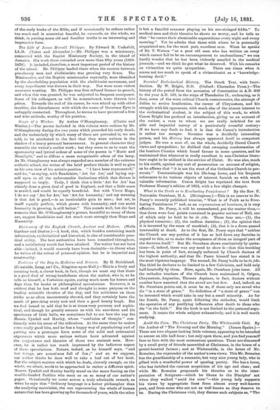Fashions of the Day in Medicine and Science. By H.
Strickland. (Ccnstable, Leng, and Co., Kingston-upon-Hull.)—This is a lively and amusing book, a clever book, in fact, though we must say that there is a good deal of wrong-headedness about the author, who is, as he tells us himself, a Yorkshire squire, caring much more for horses and dogs than for books or philosophical speculations. However, it is evident that he has both read and thought to some purpose on the leading scientific theories of the day, and his criticisms on them strike us as often uncommonly shrewd, and they certainly have the merit of provoking every now and then a good hearty laugh. But we feel bound to add that he is at times very perverse and sophis- tical, and though he greatly amuses us with his anecdotes and his specimens of Irish balls, we sometimes fail to see how the cap fits Messrs. Tyndall and Huxley, whose " confasion of thought" con- tinually stirs his sense of the ridiculous. At the same time he makes some really good hits, and he has a happy way of popularising and of putting into a grotesque form some of the solid and substantial arguments which more serious writers have advanced against the conjectures and theories of those two eminent men. How- ever, he is rather too much impressed by the ludicrous aspect of these speculations. Nature, indeed, as he himself says, "and her doings, are sometimes fall of fun ;" and so, we suppose, our author thinks he does well to take a leaf out of her book. But the subject-mattter with which he deals, cleverly enough, on the whole, we admit, needs to be approached in rather a different spirit. Messrs. Tyndall and Huxley hardly stand on the same footing as the muddle-headed Paddies who meet us on so many of our author's pages. Occasionally we come across a truly admirable remark, as when he says that "Ordinary language is a better philosopher than the analysing materialist, the one representing the whole of human nature that has been growing up for thousands of years, while the other
is but a fanciful reasoner playing on his one-stringed fiddle." To medical men and their theories he shows no mercy, and he tells us that "he curses their abominable superstitions every night and every morning." Yet he admits that those with whom he is personally acquainted are, for the most part, excellent men. When he speaks of Sir T. Watson "as a poor old man who has written an essay which cannot fail to be an encouragement to uncleanliness," we can hardly wonder that he has been violently assailed in the medical' journals,—and we think he got what he deserved. With his remarks on vivisection we quite sympathise. There are times when it seems not too much to speak of a vivisectionist as a "knowledge- hunting devil."


































 Previous page
Previous page